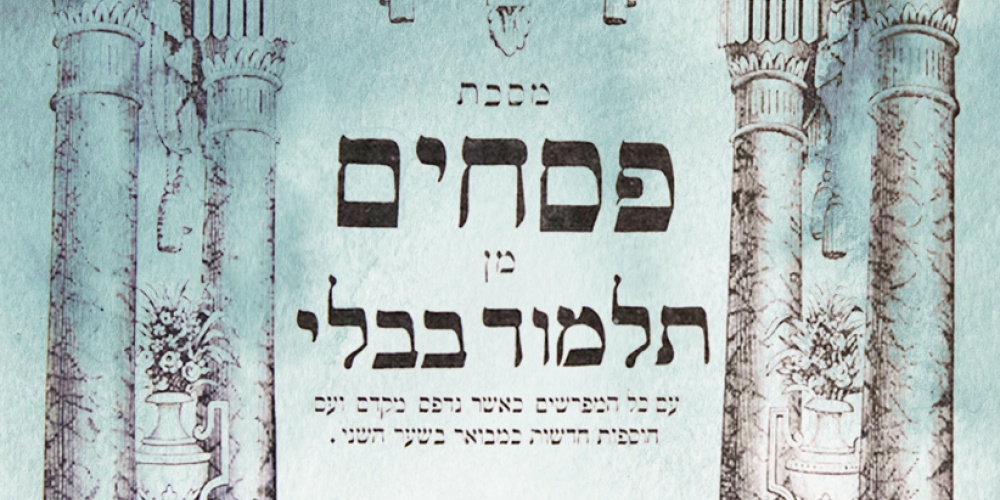
There is a fine line between matzah and chametz. They are, by definition, made of the same ingredients. All that separates them is a fleeting moment. Bake it fast enough and one fulfils the mitzvah of matzah; let it rise just a tad too long and one is looking at a punishment of karet, excision, if it is consumed on Pesach.
That chametz is the food of the free person and matzah that of a slave is another indicator that the line between freedom and slavery is fine indeed. Does one control one’s own time, or does time control them? And with Pesach all about replacing servitude to man with service of G-d, the line between the two is perhaps the easiest to cross. Is G-d at the centre of our lives, or do we worship honour, power, money, and fame? Even many who are sincerely observant run the risk of worshipping the Shulchan Aruch, forgetting that it is a mere vehicle for our worship of G-d.
Proper service of G-d and idolatry—one of only three sins for which one must forfeit one’s life rather than commit—are both called avodah, worship of G-d. The only difference between them is that the latter is zara, foreign worship that has strayed from the proper path. Yet it shares many similarities with true worship. There is good reason why, during the time period of Bible, avodah zara was the dominant mode of worship of G-d with king after king leading the people in worship of strange gods[1].
So much of life is a matter of small differences that have a huge impact. A few seconds, a few inches, a few dollars, a few marks can make all the difference. The fine line between sin and mitzvah can be seen in a number of teachings recorded in the Gemara, just before the Mishna discusses the actual order of the seder.
“Three people the Holy One blessed be He hates…[2]and one who sees a friend engaged in illicit activity and testifies alone” (Pesachim 113b).
One who has pertinent information regarding any matter of justice is required to testify: “If he does not say, he will carry his sin” (Vayikra 5:1). What would be lashon hara outside the courtroom is obligatory inside it. But as conviction requires two witnesses, there is no reason to testify alone—other than to ruin someone’s reputation. Coming to court to testify may give the appearance of loyal citizenship but is, in truth, its exact opposite, a form of hypocrisy that G-d hates.
Yet that does not mean that the testimony would not be true. Having seen the impropriety with one’s own eyes, one is allowed, or perhaps obligated—this is a matter of Talmudic debate—to “hate” such a person, even as one must refrain from talking about it to others.
Being that hatred of such an individual is allowed, the Tosafists (Pesachim 113b, s.v. shelosha) wonder why the Gemara (Bava Metzia 32b) rules that in the case of ohev leefrok v’sonei liton, a situation where one is available to help a “friend” unload an animal and an “enemy” to load an animal, one must first help the enemy to load his animal, in order “to subjugate his inclination”. Being that we are forbidden to hate others, this "enemy", the Talmud notes, must be referring to a sinner. Yet we must help this sinner first!
What makes the priority given to a sinner even more startling is that in order to limit the potential suffering of the animal, Jewish law states that under normal circumstances we are required to first help unload a burden from an animal and only afterwards help the person loading the burden on the animal. Yet if the owner of the animal looking for help to load his animal is a sinner, we must help them first in order to help us overcome any hatred we may have towards our enemy. But if we are obligated, or even just allowed, to hate this sinner, it makes little sense to tell the righteous unloader to wait while we help the sinning loader.
The Tosafists answer that while in theory, we may hate this sinner, in practice few, if any, are able to manage that fine line between permissible hatred and the much more common forbidden type of hatred. As Tosafot explains, “permissible” hatred will lead to “complete hatred”, something that makes permissible hatred forbidden[3]. In order to ensure that we do not hate the sinner, we are obligated to help him, even more than we must help the righteous. Very few are able to live up to Beruriah’s admonition to hate the sin and love the sinner (Brachot 10a), and it is the sinner we must help first. While helping animals is important, reducing strife is even more so.
This is not the only fine line that we cross at great peril. Just a few lines later, our rabbis teach that “Three hate one another...and some say, Torah scholars in Bavel”.
Our Sages contrasted the style of learning in the Land of Israel, where the Sages treated each other pleasantly, with that of Bavel, where the Sages constantly attacked one another as they disputed their views (Sanhedrin 24a). While arguments for the sake of heaven are wonderful, very few are capable of ensuring that such a machloket does not cross the line and get a bit personal. It is just much too easy to cross from disagreement to dissention.
The Tosafot Yom Tov (Pirkei Avot 5:17) notes that “arguments for the sake of heaven” ended with Hillel and Shammai. "When the students of Hillel and Shammai grew in number and did not service their teachers to the fullest extent, arguments multiplied in Israel and the Torah became like two Torot" (Sanhedrin 88b). The debates that went wrong between Reish Lakish and Rav Yochanan (see here) or Rav Huna and Rav Chisda (see here) are tragic indeed.
Pesach is the time we join together, chacham and rasha alike. Much ink has been spilled on trying to understand the difference between their respective questions. The line between the two can be thin indeed, and at times, we all cross it. Recognizing such can go a long way in bringing us closer together.
Our society, Jewish and non-Jewish alike, suffers from too many lines—or should we say, walls?—between different segments of society. This past year has taught us that no wall can keep a virus out. We are only as strong as our weakest link. And if such is true of viruses, how much more so is it true of communities?
[1] I have often thought how much better society could be if we had more avodah zara. Compared to the secular gods of Western society—money, fame, power, celebrity—avodah zara would be a huge improvement. At least, sincere avodah zara is the seeking of a relationship with the Divine.
[2] The other two whom G-d hates in the subject of my post which you can read here.
[3] Tosafot explains why theoretical hatred cannot be applied in practice. It is well-accepted that in modern times, even theoretically, hatred is not allowed. This may be so because we are incapable of properly rebuking someone, a precondition of “hatred”; or that those brought up in non-observant homes cannot be faulted for living a life of non-observance; or that absent overt miracles, these laws have no applicability; or that when the majority are non-observant, one cannot be faulted for following social norms; but in any case, the consensus is we must display extra love to “sinners”.
In a slightly different context, I vividly recall Rav Schachter telling us that it is much more important to attend the smachot of one’s non-religious relatives than one's religious cousins, going so far as to advise that it is davka our intermarried relatives whom we should invite to the Pesach seder.



